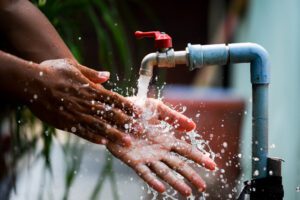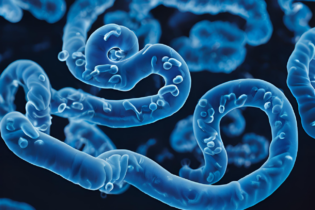The Department of Water and Sanitation (DWS) has provided the public with clarity regarding questions that are being raised regarding drinking water quality in South Africa.
This comes after the outbreak of cholera in Hammanskraal in the City of Tshwane and Parys in Ngwathe Local Municipality, Free State. An investigation is underway into the source of the cholera outbreak. Technical teams from the Department of Water and Sanitation, and the provincial and national Department of Health as well as relevant municipalities are carrying out water quality tests at distribution points and at water treatment works in areas where people have become infected. They are also engaged in tracking and tracing of infections. It is important to note that cholera is not only spread through polluted water – it is also spread through poor hygiene, eating contaminated food or by coming into contact with the faeces of an infected person. To date, the original source of the cholera infection has not been located. However, it is highly likely that the cholera outbreak which started in Hammanskraal in Tshwane (Pretoria) is related to the pollution of water sources in the area from the City’s Rooiwal Waste Water (sewage) Treatment Works upstream of Hammanskraal, which has not been well-maintained for many years, and which has insufficient capacity to deal with the volume of wastewater entering the works. The Rooiwal Waste Water Treatment Works is polluting the Apies River which flows into the Leeukraal Dam from which water is abstracted by the City’s Temba Water Treatment Works. The Temba Water Treatment Works is supposed to clean the raw water abstracted from the dam and treat it so that it is fit for human consumption. However, the water in the dam is so polluted that the Temba Water Treatment Works is not able to treat the water such that it meets the required standards for drinking water. However, tests on the water from the Temba Water Treatment Works indicate that it does not contain cholera bacteria and that it can be used for other purposes such as personal hygiene, dishwashing and washing of clothes. For this reason, the City of Tshwane is using water tankers to supply the residents of Hammanskraal within the supply area of the Temba Water Treatment Works with drinking water. The Green Drop report released by the Department in 2022 indicated that the state of many municipal waste water treatment systems is deteriorating. This means that many municipalities are discharging effluent from the waste water (sewage) treatment works which does not meet the specified treatment levels, which in turn is resulting in pollution of the rivers and dams from which municipalities and water boards draw water in order to treat it before supplying it to communities. Either water boards or municipalities treat the raw water abstracted from rivers and dams before it is supplied to households. Municipalities are not allowed by law to provide communities with water that does not meet the quality standards set by the South African Bureau of Standards. Some municipalities obtain treated water from water boards, while other municipalities have their own water treatment works. Tshwane Municipality receives treated water from two water boards, Rand Water and Magalies Water, as well as supplying residents in some areas with water from its own Water Treatment Works. Water from the Temba Water Treatment Works only supplies the Hammanskraal area in Tshwane. Water Boards and municipalities are required to conduct regular tests in line with South African National Standard (SANS) 241 (issued by the South African Bureau of Standards) on the treated water that they supply to households.The tests carried out by Rand Water, Magalies Water and the City of Tshwane on the water being distributed from other water treatment works (other than the Temba Water Treatment Works) in Tshwane and the water tankers distributing drinking water in Hammanskraal continue to indicate that such water remains fit for human consumption.
Gauteng residents may be assured that they can continue to consume water from their taps as long as their municipalities continue to indicate that the water being provided meets the requirements of SANS 241. The same applies to water supplied by municipalities throughout the country. In addition to the tests done by Water Boards and municipalities, the department, as the national regulator of the water sector is mandated by the National Water Act and Water Services Act to periodically monitor drinking water quality by collecting samples of treated drinking water from Water Treatment Works (WTW) for analysis, in order to monitor that the drinking water supplied to consumers is compliant with the South African National Standard (SANS) 241. If the department finds from its tests that drinking water does not meet the required standards, then it instructs the relevant municipality to issue an advisory notice warning residents not to drink the water unless it is first disinfected using methods such as boiling or bleaching. Rivers, dams, and streams contain raw (untreated) water, and this water is not suitable for human consumption. The department would like to urge members of the public to avoid consuming untreated water sourced from such water bodies unless it is first disinfected. The National Institute for Communicable Diseases has also set out some guidelines that should be followed regarding safe drinking water. Tap water in Ngwathe Local Municipality is safe for consumption. Regarding the reports that drinking water in the Ngwathe Local Municipality in Free State may be contaminated by cholera; the department has conducted water quality tests on all the sources of drinking water and can confirm that the analyses indicate that treated water reticulated to taps in the area complies with SANS 241 quality requirements and is therefore suitable for human consumption. It must be noted that the point in the Vaal River where AfriForum apparently took a sample of water and found the cholera bacterium, is in close proximity to a sewerage-spilling manhole that is flowing into the Vaal River. It is therefore not surprising that raw water from that part of the river tested positive for cholera. However, as indicated earlier, this does not mean that treated water supplied by the municipality contains cholera. Officials of the department have investigated the sewerage-spilling manhole and are in the process of issuing a directive to the municipality to stop the pollution. The department is currently finalising the 2023 Blue Drop Report, which will provide detailed information on the state of drinking water services in all municipalities throughout the country, following an extensive assessment process over the last year. An interim Blue Drop Watch Report will be issued next week, and the final Blue Drop report will be issued in July.




